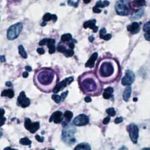What dog owners should know about this mysterious, and serious, disease.
Blastomycosis. Chances are, you’ve never heard of it.
If you have heard of it, you know this little yeast organism is a foe that should not be underestimated!
What is it?
Blastomycosis, commonly called Blasto, is a fungal organism that is found in the soil in the east-central USA. Like most fungi, it likes cool, moist, dark conditions.
Who can get it? 
People and Pets are susceptible to Blasto. Dogs are most commonly affected, as they are the most likely to have noses down in the dirt. However, people can pick up Blasto as well! Fungal organisms are inhaled, and convert to the yeast form at body temperatures. Blasto is NOT directly contagious between pets, or between pets and people.
What does it do?
This organism has some favorite locations in the body.
— Pulmonary: when the lungs are affected, the organism causes multiple lesions throughout the lungs. Cough, fever, difficulty breathing, and lethargy are the most common complaints. A severely affected patient will likely need hospitalization, treatment is long, and the prognosis is guarded. 
— Lymph nodes: Like pulmonary blasto, this is a severe infection requiring an extended treatment period. Usually blasto has affected another area of the body, not just the lymph nodes.
— Eyes: one or both eyes can be affected. Initially, we notice inflammation and a low intraocular pressure, but the inflammation quickly progresses to glaucoma (or high pressure). In many cases, the affected eye loses vision. In some cases, the eye must be removed to bring comfort to the patient.
— Bone: this creative organism is well adapted to cause painful lesions in the bone. It can look like bone cancer, so it is important to distinguish between the two.
— Skin: any non-healing wounds, draining tracts, or unexplained wounds should be suspect for blastomycosis.
What should I look for?
Blasto has a very wide variety of clinical signs. Coughing, fever, lethargy, inappetence, vomiting, difficulty breathing, and collapse can all be signs. Enlargement of lymph nodes, squinting/pain in the eyes, oozing skin wounds and lameness may also be noted in some patients. When in doubt, have your pet examined by a veterinarian.
How is it diagnosed?
Most commonly Blasto is most commonly diagnosed by looking for a specific byproduct of the organism (antigen) in the urine. This test is run by an outside lab. Blasto can also be seen in needle aspirates of wounds and lesions on the skin in some cases. X-rays should be used as a tool to evaluate lungs for lesions typical of blasto.
How is it treated?
Treatment takes a LONG time. The core of treatment is through use of strong anti-fungal and anti-inflammatory medications. Each individual patient will be treated differently based on the body system that is affected by the organism.








